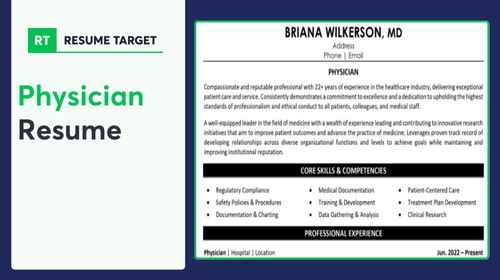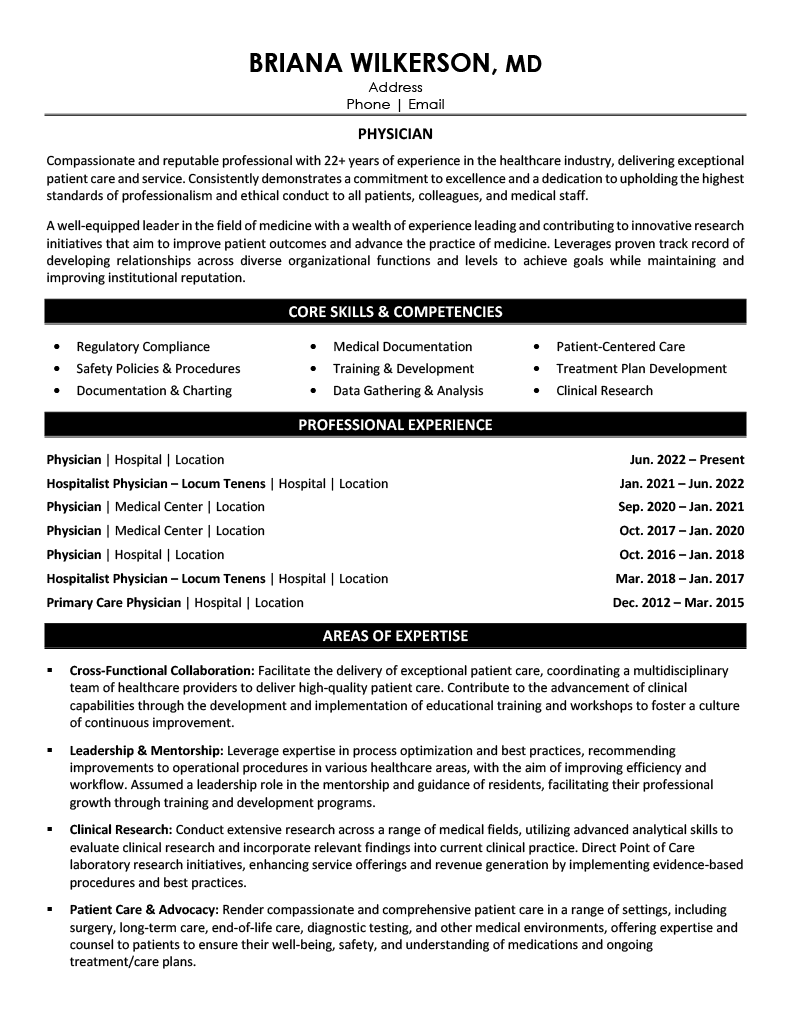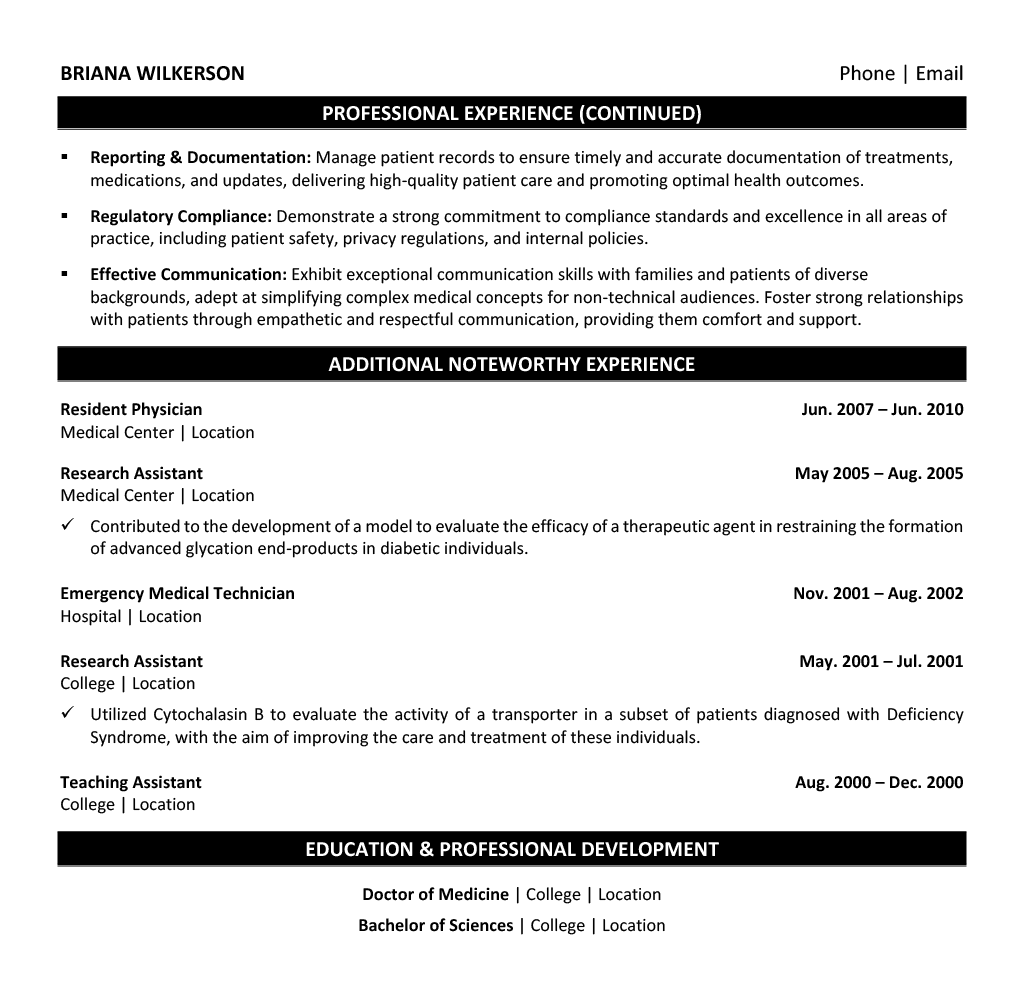

Your medical expertise is impressive, but condensing years of training and patient care into two pages feels impossible. Many physicians struggle to translate complex clinical achievements into compelling resume content.
Are you finding it challenging to stand out in a competitive healthcare market? Your resume needs to showcase both your clinical excellence and your measurable impact on patient outcomes. A strategic resume can transform your credentials from overwhelming to interview-worthy.
Resume Target specializes in helping physicians craft powerful career narratives. We know how to balance clinical competencies with leadership achievements, research contributions, and the human element of patient care that hiring managers want to see.


As the frontline defenders of human health, physicians are highly trained medical professionals who practice medicine to promote, maintain, and restore health through diagnosis, treatment, and prevention of disease.
Whether you're seeing them for an annual check-up or a complex medical condition, physicians combine their extensive scientific knowledge with clinical expertise to examine patients, order and interpret tests, prescribe medications, perform procedures, and coordinate with other healthcare professionals to deliver comprehensive care.
The journey to becoming a physician is rigorous but rewarding, involving medical school, residency training, and often fellowship specialization - let's explore how you can join this noble profession that continues to evolve with advancing medical science and technology.
Let's talk about what makes a career as a physician so financially rewarding! Your dedication to helping others through medicine comes with exceptional earning potential, and here's what's exciting - physician compensation ranks among the highest-paid professional careers, especially as you gain experience and choose your specialty.
Figures from: U.S. Bureau of Labor Statistics
Physicians have multiple paths for career growth, from clinical practice to leadership roles in healthcare. You can advance through specialization, research, teaching, or administrative positions while making a meaningful impact on patient care.
Beyond clinical expertise, your success as a physician depends on developing a comprehensive skill set that combines technical knowledge with essential soft skills.
- Clinical Decision Making - Medical Research Proficiency - Advanced Diagnostic Skills - Leadership and Team ManagementStarting your journey to becoming a physician begins with entry-level healthcare experience, typically through roles like medical assistant or patient care technician while completing pre-med requirements.
To build a strong foundation for your medical career, you'll need to develop key competencies including empathy, which is crucial for meeting both physical and emotional needs of patients, while gaining hands-on healthcare experience.
Requirements from American Board of Medical Specialties
From bustling urban hospitals to rural clinics, physician opportunities span coast to coast with high demand in primary care.
Figures from U.S. Bureau of Labor Statistics
Struggling to translate your years of medical training, clinical experience, and patient care achievements into a compelling physician resume that stands out to healthcare employers? This comprehensive, section-by-section guide will walk you through exactly how to showcase your medical expertise, clinical skills, and professional accomplishments in a format that hiring managers love.
As a physician who's spent years mastering complex medical procedures and patient care, condensing your expertise into a few powerful sentences might feel more challenging than diagnosing a rare condition.
While you excel at communicating with patients and colleagues in clinical settings, translating your extensive medical knowledge, leadership abilities, and patient outcomes into a compelling summary requires a different kind of precision - one that helps hiring managers quickly recognize your unique value to their healthcare organization.
How would you describe your medical philosophy and approach to patient care in a way that distinguishes you from other physicians in your specialty?
Reason: Your medical philosophy sets the tone for your entire resume and helps hiring managers understand your core values and practice style. This distinguishing factor can immediately resonate with organizations seeking specific cultural fits.
What combination of medical specialties, patient populations, and healthcare settings have shaped your practice as a physician?
Reason: This overview helps create a comprehensive picture of your medical scope and adaptability, allowing healthcare organizations to quickly assess your fit for their specific environment and needs.
How would you characterize your contribution to advancing medical practice, whether through leadership, research, teaching, or innovative approaches to patient care?
Reason: This helps articulate your broader impact on the medical field and demonstrates your value beyond direct patient care, which is particularly important for positions in academic medicine or leadership roles.
As a physician, your skills section needs to strike the perfect balance between showcasing your clinical expertise and highlighting the interpersonal abilities that make you an effective healthcare provider.
From specialized medical procedures and diagnostic capabilities to essential soft skills like patient communication and team leadership, your resume should reflect both the technical precision required in medical practice and the human touch that defines quality patient care.
Showcase your medical expertise by organizing your clinical experience into three powerful sections: a concise role overview highlighting your specialty and practice setting, quantifiable achievements demonstrating patient care outcomes, and core responsibilities that reflect your medical competencies and leadership abilities.
Many physicians struggle to translate complex clinical outcomes and patient care excellence into compelling resume achievements that resonate with hiring managers. Transform your clinical impact into powerful metrics by connecting patient outcomes, quality measures, and operational improvements to specific benchmarks that demonstrate your value as a healthcare leader.
The responsibilities section demonstrates how you deliver patient care while managing complex medical decisions and leading healthcare teams. Your ability to communicate technical medical work clearly shows recruiters how you contribute to overall patient outcomes and hospital operations.
Your medical credentials are the foundation of your physician career, so list your board certifications and medical degree first. Make sure to highlight your specialization and any fellowship training, as these demonstrate your expertise in specific areas of medicine.
Now that you've created a strong foundation using Resume Target's comprehensive resume writing guidelines, you're ready to transform your medical CV into a powerful tool for specific physician positions.
While many physicians focus their customization efforts solely on cover letters, tailoring your resume for each specific medical role or healthcare facility is equally crucial for standing out in this competitive field.
A customized physician resume not only navigates through healthcare-specific ATS systems with precision but also demonstrates to medical directors and hiring committees that your clinical experience, specializations, and achievements align perfectly with their institution's needs.
Ready to make your physician resume work harder for you? Let's transform it from a standard CV into a targeted document that opens doors to your ideal medical position!
Just completed your residency? Perfect timing to launch your medical career! Your journey to becoming a physician has equipped you with valuable clinical experience, medical knowledge, and patient care skills that employers are actively seeking.
Focus on highlighting your clinical rotations, research experience, and specialized medical training to create a compelling resume.
Check out our Student Resume Writing Guide for expert tips on showcasing your medical education, residency achievements, and technical competencies.
Your medical training and clinical rotations have equipped you with valuable hands-on patient care experience that deserves to be highlighted front and center in your resume summary.
Focus on showcasing your specialized medical knowledge, clinical competencies, and the direct impact you've had on patient outcomes during your residency and internships.
"Dedicated and compassionate Physician with comprehensive medical training and 3+ years of clinical experience through residency at leading healthcare institutions. Demonstrated expertise in patient assessment, diagnosis, and treatment planning, with particular strength in internal medicine and emergency care. Proven track record of delivering high-quality patient care while effectively collaborating with cross-functional medical teams. Seeking to leverage strong clinical foundation and commitment to patient-centered care in a challenging physician role at a progressive medical facility."
Now's your chance to showcase the rigorous medical training that has prepared you for clinical excellence - make every degree, rotation, and specialized certification count!
Don't just list your medical school - highlight key clinical rotations, research projects, and specialized training that align with your target specialty, like noting your cardiology rotation achievements when pursuing a cardiology position.
unavailableRelevant Coursework: Clinical Medicine | Human Anatomy | Pathophysiology | Pharmacology | Medical Ethics | Patient Care Management
Key Projects:
Clinical Rotation Research Study: Conducted comprehensive analysis of treatment outcomes for diabetic patients in primary care setting, resulting in development of improved patient education protocols.
Emergency Medicine Protocol Development: Collaborated with interdisciplinary team to create standardized response protocols for high-risk cardiac emergencies.
Leverage your medical school training, clinical rotations, and residency experience to showcase the comprehensive blend of clinical expertise, patient care abilities, and technical proficiencies that make you an outstanding candidate for physician positions.
As a newly qualified physician, your combination of modern medical knowledge, hands-on clinical experience, and dedication to patient care positions you perfectly to begin a rewarding career in medicine, with excellent opportunities for specialization and advancement.
Let's face it - translating years of complex patient care, clinical procedures, and medical expertise into a compelling resume can feel like diagnosing a challenging case without any diagnostic tools.
At Resume Target, we specialize in crafting physician resumes that effectively communicate your clinical excellence and patient outcomes to both medical directors and HR teams.
Our deep understanding of healthcare recruitment means we know exactly how to position your specialized skills, whether you're transitioning from residency to attending physician or seeking a leadership role in a major healthcare system.
With hiring cycles in full swing at major medical centers, now is the perfect time to ensure your resume reflects your true value - schedule your free consultation today to start your journey toward your next career milestone.
Impress any hiring manager with our Medical resume writing service. We work with all career levels and types of Medical professionals.
Learn More → Medical Resume Writing Services